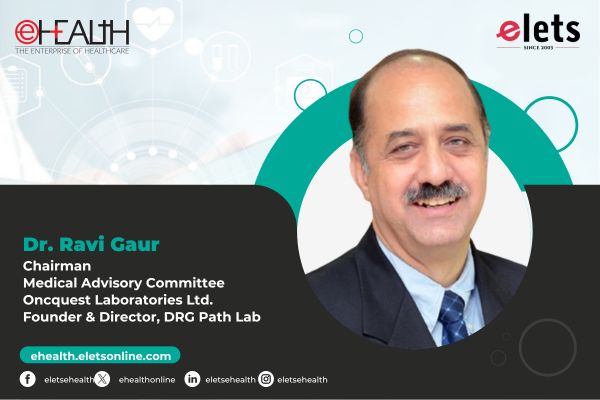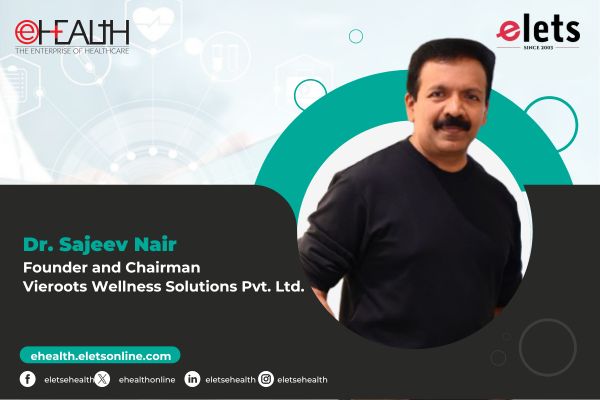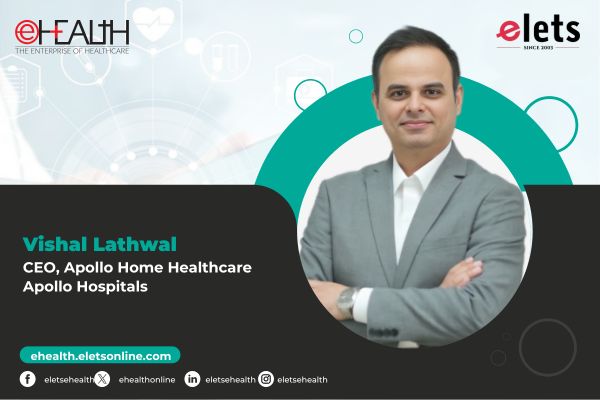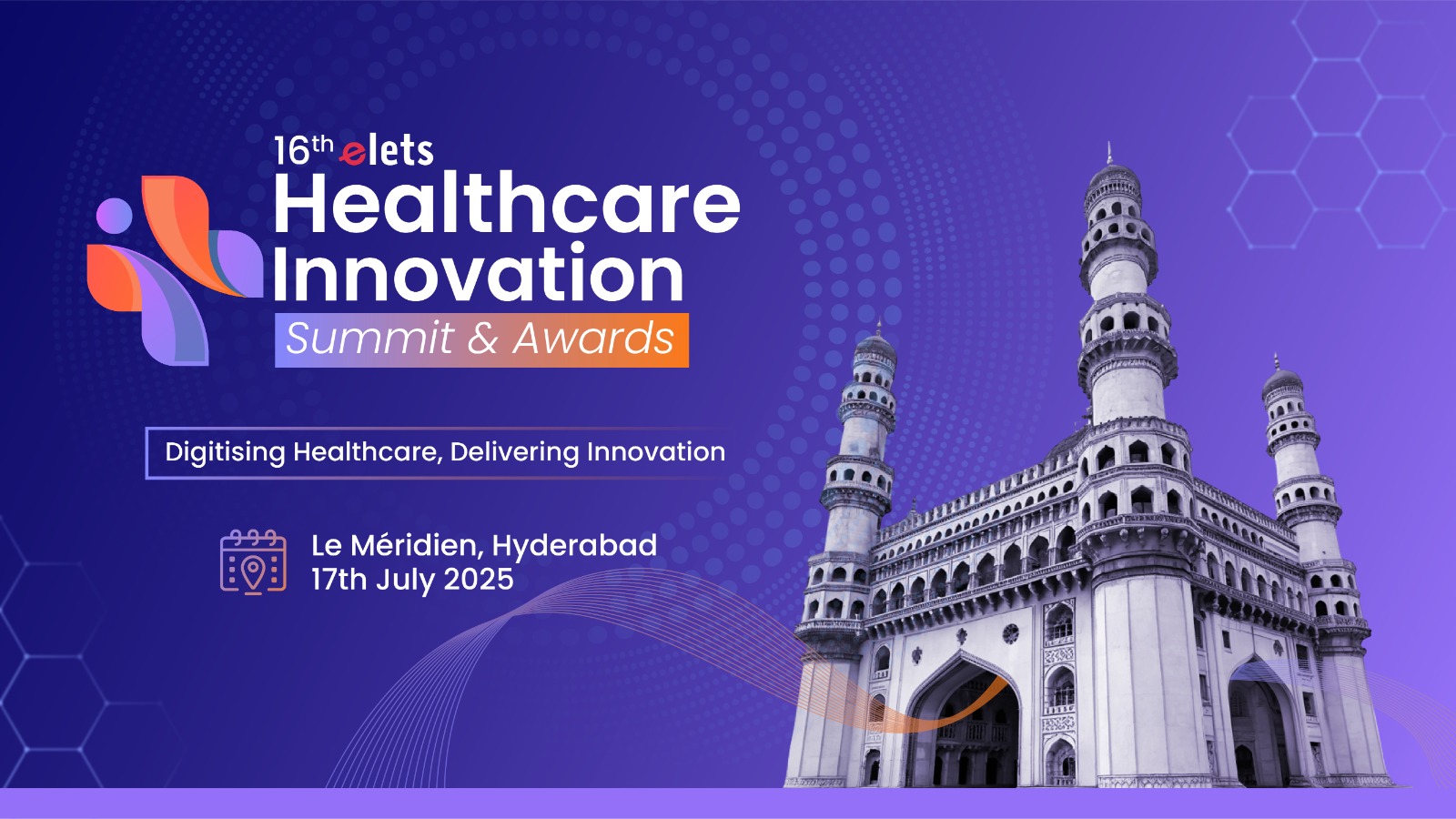
Jatin Mahajan, Managing Director, J Mitra & Co., writes about the role of modern technological innovations in enriching and enhancing healthcare experiences. These technologies have offset challenges at different levels, catalysing flawless service to the people.
Diagnostics are the first line of defence towards better health and fitness. It is the backbone for ascertaining the ailments and deciding on the correct course of treatment, surgery and medication. 70 per cent of the medical decisions are based on diagnostics. The diagnostics segment has witnessed tremendous changes in the past 20 years. There has been a movement of sorts with digital & technology innovations driving diagnostics as a whole.

Engineers are for Engineering and Doctors are for Medical. Right?

In the present-day scenario, this statement is too far from truth. The two divergent fields are now converging and making a very significant impact.

Artificial Intelligence (AI) has pervaded the healthcare space and become the absolute game changers, catalysing immense developments in diagnostics, detection, management and treatment of ailments. AI can analyse and interpret data in more complex and diverse combinations than a human mind, providing extremely potent data for effective and accurate diagnostics. Medical imaging has become the leading and most popular field for AI applications.

Internet of Things (IoT) is another major area that is catalysing astonishing developments with the convergence of healthcare &engineering. IoT has disrupted the healthcare industry by intelligently connecting devices, systems, and objects that are used by billions of people worldwide, to utilise and leverage data and enable more timely, specific, and contextualised decisions.
Also read: Oncquest Lab acquires Quest Diagnostics Indian facilities
IOTs impact on the Healthcare segment is humongous. Across the world, the healthcare industry is transforming itself into a system that is well-coordinated, user centric, and more efficient. IoT’s evolutionary technology is driving game-changing and life-enhancing solutions across the healthcare segment. IoT catalyses automation of processes, and the advantages are endless.
There are multifarious benefits of IOT in healthcare
Error Mitigation – IoT results in accurate data collection, work flow automation and waste minimisation. Most importantly, it reduces the risk of error.
Decreased costs – With IoT, real time patient monitoring is possible and convenient. This not only results in optimisation of doctors’ time involvement and visits. Connected home care facilities will reduce hospital-stays and re-admissions.
Enhanced patient experience – A connected healthcare ecosystem results in dedicated procedures, improved treatment and accurate diagnosis.
Better disease management – With real-time data, doctors have better and continuous monitor capabilities – making detection of any disease possible.
Homecare / Remote Monitoring – Better monitoring of patients in the comfort of their own homes through Smart Body Sensors.
Telemedicine – Patients can be treated remotely reducing cost, enhancing efficiencies.
Smart Pills and Wearable Medical Devices – FitBit, Apple / Samsung / Google watches, Smartphones, Smart bandages – monitoring and reporting various parameters on a minute-by-minute basis.
Digital Healthcare Records – Centralised management of healthcare records would ensure immediate, timely and accurate retrieval, leading to better diagnostics and treatment.
Healthcare Automation / Robotic Surgeries – This is another benefit that is increasingly being adopted in both critical and repetitive functions.
The IVD (in-vitro diagnostics) segment is also witnessing major developments –Fluorescence immunoassay (FIA) is a very recent development in the IVD space. It is a sensitive technique that can be used in the measurement of many compounds, including drugs, hormones, and proteins; in the identification of antibodies; and in the quantification of antigens such as viral particles and, potentially, bacteria.
At J Mitra, innovation is a way of life. R&D forms the backbone of our operations, and based on extensive research, we have over 55 patents in the Indian market. Our latest innovation (based on FIA has been the launch of India’s first portable diagnostic solution – the iQuant immunoassay analyser in collaboration with IIT Madras’ HTIC (Healthcare Technology Innovation Centre) and Department of Biotechnology, Ministry of Science & Technology. This portable device is a state-of-theart Fluorescence Immunoassay Analyzer for quantitative and qualitative determination of blood 9 Diagnostics Test – Dengue NS1, Dengue IgM, Dengue IgG, HbA1c, TSH, T3, T4, Vitamin D and CRP, with other tests to be added in a phased manner.
iQuant is an innovative mix – on the product side, it is a mix of science, IT, healthcare and research, while on the implementation side it is great combination of social conditions, ground realities coupled with business sense. This is an innovative, path-breaking product that will greatly influence the detection and diagnostic process, which will hasten the treatment and cure process – resulting in a healthier India, in line with government’s healthcare-for all initiative.
Other lab automation tools are making the diagnostics segment more and more effective while at the same time leading to massive reduction in cost and timelines. Point-of-care is moving closer and closer to the patients, and feature rich affordable diagnostics are soon going to be available even in remote and rural places.
The diagnostics segment has become more visible because of extremely-huge, multi-city, multi outlet large format central labs, pathology labs and corporate hospital chains complementing the regular neighbourhood pathological outlets. Their digital persona and online presence are ensuring that the patients no longer have to travel to them, but the laboratory services reach out to the patients at their location and at their convenience. Automation of various diagnostic tests have come as a boon for the industry majorly cutting down the turnaround time for accurate and reliable results, while ensuring that a greater number of tests can be handled at the same time. This has also resulted in reduction in lab-related errors, and further lowering of the prices.
In Conclusion
AI and IoT have changed the way medical services are delivered. The future of IoT is very bright in the healthcare segment with an estimated 20 billion connected devices and growing exponentially day by day. A key area that would see phenomenal growth is remote medical assistance. IoT has changed the future of healthcare, making it more robust and efficient. It is now just a matter of time that these advancements in healthcare would also start impacting the cost implication for the end consumers – the patients. That is when technology will become the true harbinger of mass benefit!
It is going to be a very interesting next few years for the healthcare industry in general and the diagnostics industry in particular.
Be a part of Elets Collaborative Initiatives. Join Us for Upcoming Events and explore business opportunities. Like us on Facebook , connect with us on LinkedIn and follow us on Twitter , Instagram.
"Exciting news! Elets technomedia is now on WhatsApp Channels Subscribe today by clicking the link and stay updated with the latest insights!" Click here!














